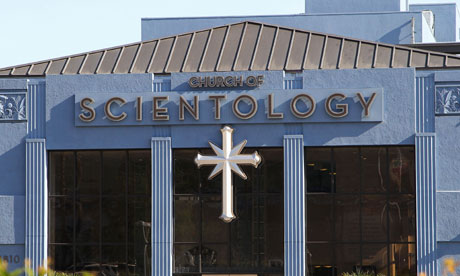L Ron Hubbard's church is under increasing attack, but by calling itself a religion Scientology is shielded from scrutiny

'Add religion to its treasure and power to intimidate, and the Church of Scientology may seem untouchable.' Photograph: Startraks Photo/Rex Features
Millions of Americans watching the Super Bowl were treated to a soft-voiced ad featuring knitting pattern magazine models boosting the church that L Ron built, but elsewhere the Scientology spring is gathering pace. The latest hammer blow against the church that likes to wear dark glasses is Beyond Belief: My Secret Life Inside Scientology and My Harrowing Escape – a misery memoir by Jenna Miscavige Hill, alleging that her uncle, Scientology's "Pope" David Miscavige, is evil. A charge he denies.
Add a major lawsuit in the US by aggrieved ex-members, a criminal prosecution in Belgium, a war of attrition across the internet and three highly critical books so far this year.
Fear of Britain's libel laws meant that Going Clear by Lawrence Wrightwas not formally published in the UK, and no big UK publisher would touch my book, Church of Fear, but all three books are now on sale and make for horrible reading for "Pope" Miscavige and his celebrity apostles Tom Cruise and John Travolta.
Yet critics who hope that the end of the Church of Scientology is nigh are probably deluded, until someone powerful and brave on the other side of the Atlantic steps in.
Not every action of the government of the United States of America is for the best. Not every British institution is bone from the neck up.
Take the decision by the Internal Revenue Service – the American tax man – in 1993 under the Clinton administration to stop treating the Church of Scientology as a business and reclassify it as a religion.
"Pope" Miscavige – later, Tom Cruise's best man at the star's wedding to Katie Holmes – told his faithful: "The pipeline of IRS false reports won't keep flowing across the planet. There will be no more nothing – because on October 1 1993, at 8.37pm Eastern Standard Time, the IRS issued letters recognising Scientology and every one of its organisations as fully tax exempt! The war is over!" Everyone clapped.
Not everything that calls itself a religion is a religion. It could be a multibillion-dollar corporate, an organisation with a mafia-like hold over followers, or a brainwashing cult. Some ex-members say the Church of Scientology is all three.
On this side of the Atlantic, as far as the Charity Commissioners are concerned, for the purposes of English charity law: "Scientology is not a religion."
In Britain, Scientology's war, as it were, is not over.
Yet the church is protected in the US – its spiritual home – by the shield of that word, religion.
Words bite. Rebaptise a thing a religion and it is instantly better protected from scrutiny, mockery and taxes. Add the shield of religion to its treasure and power to intimidate, and the Church of Scientology may seem untouchable. Is it?
The dictionary definition of a religion is: "The belief in and worship of a superhuman controlling power, especially a personal God or gods." But who is the superhuman controlling power Scientologists believe in? No Scientologist will tell you.
The underlying logic of the British test is that a religion must be open to all and open about itself.
Alex Klein wrote on BuzzFeed: "All religions have their Xenus, multi-armed elephants, or magic babies, their morally ambiguous prophets, their tall tales and scandals."
That's not quite right. Go into a Christian church and they will tell you about the "magic baby", Jesus. You will see images of him, everywhere, dating back almost 2,000 years. Go into a Hindu temple and you will see images of Ganesh, the multi-armed elephant God, everywhere, images that go back millennia. Go into a Church of Scientology Org and you will see no image of Xenu. No member of the Church of Scientology will admit to Xenu's existence, but ex-Scientologists say he is at the heart of its cosmology. Scientology fails the British test of what is or is not a religion because it is not open about what it believes in. A belief system that tells lies about its core belief does not have the automatic right to be treated as a religion.
This is not a purely cosmological dispute, as I have found out, while investigating the church for half a decade. (I started badly by losing my temper with Scientologist Tommy Davis while making BBC Panorama'sScientology and Me in 2007. I apologised then; I apologise now.)
Law enforcement gives religion the warm shoulder. While making a follow-up Panorama in 2010, we became aware that some of our interviewees had met the FBI previously. The Feds and Panorama were both working on a parallel investigation: its subject allegations of physical and psychological abuse that the church categorically denies. Ex-members of the church – such as Mike Rinder, its former spokesman and head of the office of special affairs, who had "defected" to Panorama – gave specific evidence of that abuse, backed up by several other senior ex-Scientologists. (The church has an online cartoon of Rinder as a fanged cobra.)
Thanks to what critics say is the absurdity of Britain's libel laws, we were unable to broadcast the most shocking allegations of abuse in 2010 – they're in my book – but we did air grave criticisms of the church. The FBI investigation has gone nowhere. The reason? One ex-Scientologist who assisted the FBI told me: "They got it. The investigators we were talking to knew what they were doing. Then someone upstairs seemed to raise the stakes. They had to have video evidence of wrongdoing, an admission of guilt, or else nothing would happen."
Of course, all of the above may well be untrue and the FBI investigation may have failed for the simple fact that there was nothing to investigate.
All I know for certain is that an FBI investigation was running and nothing has happened. It turned out, my source said, that the church had more money to spend on this and more resolve than the FBI. The thing that may have killed the investigation was that the FBI was afraid of taking on an official religion. If true, that does not sound good. Perhaps Britain's Charity Commissioners should have a word with the G-Men. They don't tote tommy guns but they can spot a non-religion when they see one.
• This article was amended on 7 February 2013. The sixth paragraph originally referred to the Inland Revenue Service. It should have been the Internal Revenue Service, and this has now been corrected.

No comments:
Post a Comment